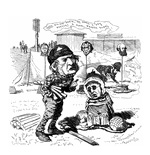
Which Way the Wind Blows
FORBIDDEN WORDS AND ACTIONS
A small news bite came to the country’s attention a few years ago. Somewhere in Tennessee, a young girl was suspended from her school for having said “Bless you!” after a fellow student sneezed. She apparently violated classroom protocol, established by her teacher, according to which well-wishing in the form she uttered it had been proscribed in a list of forbidden phrases.
A mere straw in the wind? Perhaps. But such straws show the direction of the wind, and that vector can have serious consequences for those in its path, particularly when the wind is strong. And there have been ever so many such straws in recent decades. We are forced to encounter in our reading, listening, and viewing accounts of intemperate students — typically “outraged” — demanding this or that “right” drawn from a grab-bag of innumerable potential claims on others’ behavior. Doctrinaire professors at every sort of institution from theological seminaries to “premier” state universities demand a priori assent to the current progressive party line established in the professors’ syllabi and initial lectures as if in Pravda.
Established — until the times do alter, of course. Trends change as the times change. We must make room for the defense of pacts with the enemy, as did Stalin, for only the enlightened advance guard of the party knows where history is heading and thus has the warrant to direct the rest of us. It is as it was with Robespierre: the “General Will” now demanded this, and subsequently that. But it invariably spoke through the mouth of Robespierre.
Pavlik Morozov was a state- and party-certified children’s hero of the Soviet Union, celebrated in story and song for having betrayed his kulak father to the party. The father had hidden potatoes for his family’s consumption against the hard times brought about by the collectivization of farms and the necessities of Soviet foreign-trade policies in the 1920s and early 1930s. The father was shot as an enemy of the people. Pavlik himself was subsequently murdered by vengeful peasants and thus became a “people’s hero,” a model for Soviet schoolchildren as early as their kindergarten year.
You May Also Enjoy
Pushers of political correctness now desire, if not demand, something called "deep diversity" — that is, eliminating all signs of "whiteness" from campuses across the country.
Peru, Mexico, and Santo Domingo were thriving centers of Western civilization, with universities and printing presses, when Harvard was still an uncultivated field.
In this special section, which runs as an occasional feature, we present samples of the offerings in the Narthex, the NOR’s online blog.

